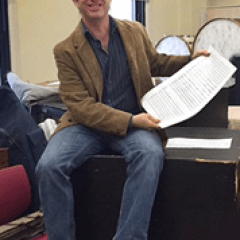
Commissioning New Works of Music: Some Notes and Bolts
COMMISSIONING NEW WORKS OF MUSIC:
SOME NOTES and BOLTS
by Cantor Jonathan Comisar
One of the most rewarding creative endeavors in my music career has been the composition of new synagogue music, specifically as part of a commission. It's exciting to collaborate with a cantor and/or synagogue community to create something tailor-made for a celebratory event such as a dedication or anniversary, the honoring of a spiritual or community leader, or to be composing something that will enrich the musical/artistic life of a specific synagogue.
We Cantors and synagogue musicians have not spoken enough in detail about the concept and process of commissioning new Jewish music. Often, younger, recently graduated Cantors have approached me with the possibility of a commission, but do not know the first thing about what is involved or how to speak to their rabbis and community leaders about embarking on this creative journey.
So, I will share some of my experience and knowledge and hopefully this can be the beginning of a larger communal discussion-hopefully at ACC conventions, the DFSSM, and amongst our colleagues.
VALUE
The first important concept is the VALUE of a commission. The hiring of an accomplished composer to create an enduring musical work of meaning and beauty is equivalent to hiring a gifted carpenter or craftsperson to design an aron kodesh, neir tamid, or the accoutrements for the Torah scrolls. The setting of a liturgical text to music is at the highest level of hiddur mitzvah, the beautification of a sacred deed. The development of a compositional gift draws upon innate talent, but more importantly, years of study, experience, trial and error, and dedication. A new liturgical work, especially one with multiple voices, instrumentation, and/or original text demands hours of painstaking work. It also requires an understanding of Hebrew, the scheme of liturgy, and the synagogue service. Because there is a lack of appreciation for the arts in this country, it is often necessary to educate rabbis, synagogue treasurers, and board members about the comprehensive task involved in generating an original piece of music. A piece of music is not discovered like collecting manna from the heavens. Sometimes a melody or a rhythm will magically appear as a gift. But for most of my compositional work, I have found that the chiseling, carving, and welding take substantial time and effort.
MONETARY COMPENSATION
Each commission project is unique and it would be unfair to set a price listing for works. But someone new to the commission process should know that this kind of work is worth more than a few hundred dollars and will likely cost several thousand dollars. This, of course, must be negotiated between the composer and the commissioners. Some things to bear in mind are the length of the work, the musical forces required (voices, choir, instrumentation), the need for original lyrics, the blending of English and Hebrew. Each additional element of complexity will require more hours working on the score and should be compensated accordingly. Cantors should consider earmarking commission funds into their music budgets when they negotiate their contracts or obtain permission to do some private fundraising within the community.
CONTRACTS
It is advisable to draw up a good will agreement or an official attorney prepared document. Some crucial things to remember:
1) The ownership of the new composition remains with the composer.
(unless there is an agreement otherwise).
2) The rights of the synagogue include:
a) Rights to the first performance/premiere of the piece
b) A phrase of dedication/acknowledgement of the commissioning synagogue on all subsequent copies of music (including publication)
c) Permission to copy without limits and perform the commissioned piece in perpetuity.
FUN, CREATIVE COLLABORATION
My advice to Cantors is to make the commission process a creative and fun exploration. Spend time with the composer brainstorming ideas. What kind of message do you want the work to convey? Does a sacred or poetic text call to you or are you hoping for original words? What is the musical culture of your synagogue and how might you weave them into the piece?
(adult and junior choirs, synagogue band, a gifted instrumentalist in the community). Do you want this piece to have a life beyond the premiere and have a use in the larger Reform movement? All important questions to ask, but ask them in an open and playful way.
Once an idea is agreed upon, the collaboration continues. I will share the first sketches of a piece and we discuss the direction of the piece: "Is this the spirit and texture you had in mind? Should there be a change in tempo, rhythm or harmony, interplay of voices, where the climax of the music occurs?" At a certain point, the composer needs to be trusted to carry the work to fruition. But a respectful and open tête à tête is good grist for the creative mill.
My final word is one of encouragement. We need new music. Some of the most enduring and transcendent works of music began as a commission. Seek out the composer that is right for your project and be part of an exciting journey.

